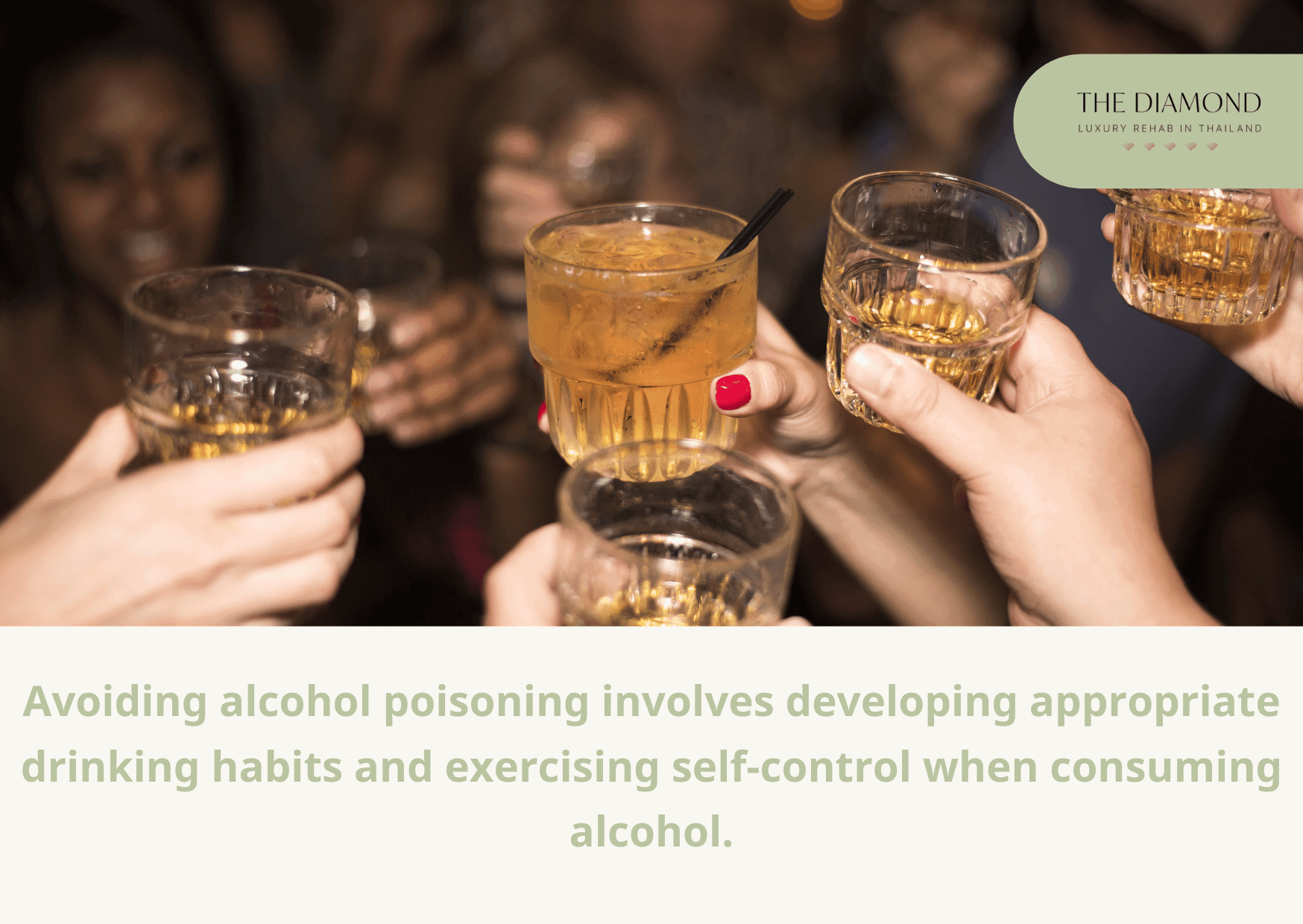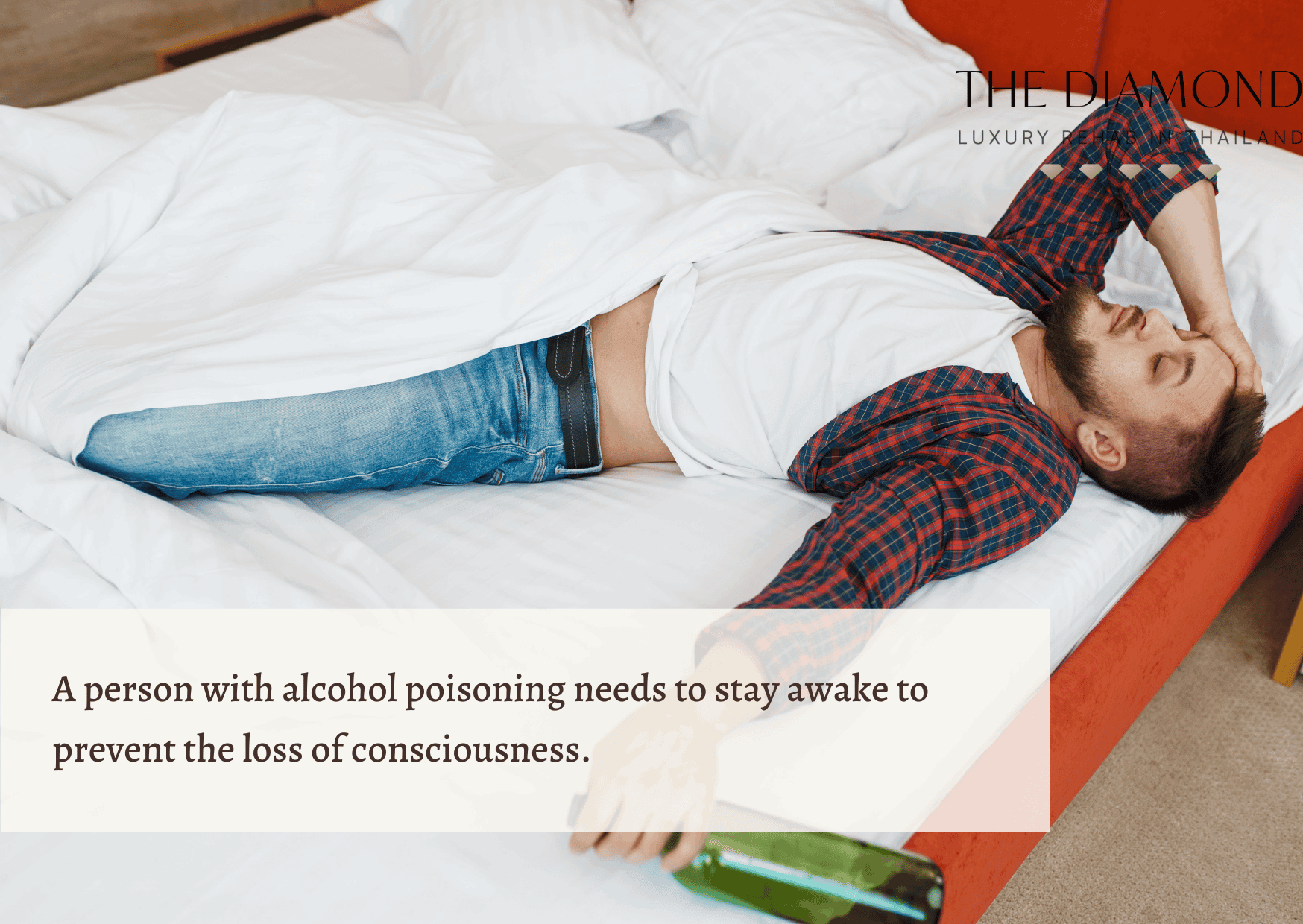Alcohol poisoning: symptoms and causes

Alcohol poisoning is a serious, and potentially lethal, consequence of consuming excessive amounts of alcohol in a short timeframe. According to a 2015 article titled, “Alcohol Poisoning Deaths: A Deadly Consequence of Binge Drinking” from the Centers for Disease Control and Prevention (CDC)’s publication Vital Signs, in the United States, alcohol poisoning claimed the lives of six individuals every day on average between 2010 and 2012.
The most prominent symptoms of alcohol poisoning are confusion, slow breathing, and vomiting. Additionally, seizures and low body temperature are among the symptoms of alcohol poisoning.
The reason alcohol poisoning occurs is that excessive levels of alcohol shut down vital areas of the brain that regulate heart rate, breathing, body temperature, and other functions. People usually develop alcohol poisoning when engaging in binge drinking sessions.
Since alcohol poisoning is a serious complication, it requires emergency action. This post sheds more light on symptoms, causes, treatment, and other useful information about alcohol poisoning.
When does alcohol poisoning occur?
Alcohol poisoning occurs when blood alcohol concentration (BAC) is at 0.250-0.399%, a 2021 article titled, “Blood Alcohol Concentration” from the University of Notre Dame explains. Blood/breath alcohol concentration describes the amount of alcohol in a person’s breath or bloodstream. It is expressed in grams of ethanol in 100 milliliters of blood (or 210 liters of breath).
Generally speaking, alcohol intoxication happens at a different rate from one person to another. For instance, a man weighing up to 160 pounds is likely to experience alcohol poisoning after consuming 15 shots of hard liquor in three to four hours. On the other hand, a woman weighing up to 120 pounds will develop alcohol poisoning after consuming nine shots of hard liquor in the same timeframe.The concentration of alcohol in the blood continues to rise for up to 30-40 minutes after the last drink. As a result, alcohol poisoning symptoms may become a lot more severe, according to an article titled, “Alcohol Poisoning” last reviewed in January 2023 by the National Health Service (NHS).

What are the symptoms of alcohol poisoning?
The symptoms of alcohol poisoning include a variety of serious physiological and behavioral signs that occur when a person consumes an excessive amount of alcohol in a short period. The most common alcohol poisoning symptoms are listed below.
- Confusion: disorientation, slow responses and reaction time, being unable to walk
- Seizures: Tonic-clonic seizures that involve both jerking or twitching and stiffening of muscles
- Vomiting: occurs when a person drinks alcohol so much their body is unable to process everything
- Irregular pulse or breathing: the gap between two breaths is longer than 10 seconds
- Slow breathing: taking less than eight breaths per minute
- Hypothermia: low body temperature
- Passing out: unconsciousness and difficulty regaining consciousness
- Pale or blue-tinged skin: clammy, pale, cold, and blotchy skin occurs due to low body temperature
What are the possible causes of alcohol poisoning?
The causes of alcohol poisoning revolve around excessive alcohol intake within a short period which results in a large percentage of alcohol in the blood. The possible causes of alcohol poisoning are listed below.
- Binge drinking: a pattern of heavy drinking when a female consumes four or more drinks in two hours or a male takes five or more drinks during this timeframe. The liver is unable to process excessive amounts of alcohol, which results in alcohol poisoning. The faster a person drinks, the higher BAC becomes. Consuming alcohol quickly can raise BAC to a point where it impairs both physical and mental abilities, A 2023 article by Tim Newman for Medical News Today explains.
- Other types of alcohol (non-ethanol): Ingesting methanol or ethylene glycol (an ingredient in antifreeze, solvents, and paints) and isopropyl alcohol (found in lotions, rubbing alcohol, and certain cleaning products), can cause alcohol intoxication that urgently necessitates medical attention, a 2023 article titled, “Alcohol poisoning” from Mayo Clinic reports. However, most cases of alcohol poisoning account for ethyl alcohol, found in alcoholic beverages.

Who is at risk of alcohol poisoning?
People who engage in frequent binge drinking sessions are at the highest risk of alcohol poisoning. Various factors are involved in one’s risk of alcohol poisoning. These include size and weight, overall health, whether a person has eaten recently, and whether they’re combining alcohol with other drugs and substances.
Other risk factors include the percentage of alcohol in drinks, the amount and rate of alcohol intake, and tolerance level. In a nutshell, larger people absorb alcohol more slowly than smaller men and women. The more water in the blood, the more diluted alcohol becomes.
The lower the body weight, the less water and blood a person has. For that reason, smaller people tend to have a higher ratio of alcohol in their blood if they consume an equal amount as heavier persons.
At the same time, having food in the stomach slows down the absorption of alcohol. Drinking on an empty stomach puts a person at a higher risk of negative consequences, even alcohol poisoning. Certain medications negatively influence the absorption of alcohol as well and contribute to alcohol poisoning.
Men and women who drink regularly tolerate alcohol better than occasional drinkers. Of course, this isn’t the instruction to drink more frequently because it’s harmful to overall health.
Young adults, e.g., college students, and adults aged 35 or older are more likely to get alcohol poisoning. This consequence of irresponsible alcohol intake is more common in men than women.

How to avoid alcohol poisoning?
Avoiding alcohol poisoning involves developing appropriate drinking habits and exercising self-control when consuming alcohol. The ways on how to avoid alcohol poisoning are listed below.
- Avoid drinking alcohol or stick to moderation: The most logical step to prevent alcohol poisoning is complete avoidance of drinking. However, those who choose to drink must do so in moderation. For healthy adults, moderation means up to two drinks a day for men up to 65 or younger and a maximum of one drink a day for women of all ages and males older than 65 years.
- Decrease the rate or pace of drinking: Men and women who choose to consume alcohol must drink slowly. Drinking fast contributes to alcohol poisoning.
- Eat something: Having food in the stomach is another important way on how to avoid alcohol poisoning. Drinking on an empty stomach paves the way to side effects and other adverse reactions, including alcohol poisoning.
- Store products safely: Alcohol poisoning doesn’t occur by drinking alcohol only, it happens with other forms of alcohol as well. For that reason, it is necessary to store alcohol-containing products in the household safely, especially if small children live there. All products need to be out of their reach.
- Stay alert: avoid having a drink if its content is unfamiliar or it’s mixed with energy drinks.
- Avoid mixing alcohol and medications: Men and women take prescription medications to manage their underlying health conditions. This is particularly the case among middle-aged or older adults. Mixing pills and alcohol is never a good idea.
- Stay hydrated: Drinking water after every alcoholic beverage reduces the risk of alcohol poisoning.
- Say no to drinking games: While these games seem fun, especially for college students, they pave the way to irresponsible intake of alcohol, binge drinking, and eventually alcohol poisoning. It is necessary to avoid participating in these games and activities.
- Avoid “mega” drinks: Beverages like Long Island Ice Tea and other XXL drinks contain a lot more alcohol than a standard drink. While they seem harmless to some people, these drinks introduce more alcohol to the body and consuming them is likely to result in alcohol poisoning.
Numerous individuals wonder how to avoid alcohol poisoning. The only foolproof way to make it happen is to simply avoid drinking alcohol entirely. Those who choose to drink reduce the risk of alcohol poisoning with these instructions on how to prevent alcohol poisoning:
- Stay hydrated
- Don’t drink on an empty stomach
- Stick to moderate intake
- Avoid drinking games and combining alcohol and prescription pills
- Educate children, loved ones, or friends about the dangers of excessive alcohol intake

When should you seek medical attention?
You should seek medical attention if you experience symptoms and signs of alcohol poisoning, or even if few yet intense symptoms occur. It is particularly important to get medical attention to a person who is unconscious and can’t be awakened because they’re at a high risk of dying.
It is important to bear in mind that alcohol poisoning is a medical emergency. Alcohol poisoning is not something that a person ignores. When someone has alcohol poisoning, they need to call the local emergency number instantly and be prepared to provide information. Hospital emergency personnel will need to know what kind of alcohol was consumed and how much.
In case a person is unconscious, make sure not to leave them alone. Alcohol poisoning affects the gag reflex, which is why an individual with alcohol poisoning is at risk of choking on their vomit and is not able to breathe. Additionally, one must never make a person with alcohol poisoning vomit (if they can’t) because they are likely to choke.
However, if a person is vomiting, it’s important to keep them sitting up. Make sure to turn their head to the side if they need to lie down. This will prevent choking. A person with alcohol poisoning needs to stay awake to prevent the loss of consciousness.
The biggest obstacle here is that some people are afraid to get help. Sometimes a person doesn’t think they (or someone else) have alcohol poisoning. In other cases, they’re worried the other person will get angry if they seek help.
A prompt reaction and medical attention are vital for saving someone’s life from alcohol poisoning. The sooner a person with alcohol poisoning gets medical treatment, the better the outcome, according to an article titled, “Alcohol Poisoning” last reviewed in October 2020 by the Cleveland Clinic.
While waiting for an ambulance, it’s useful to give a person with alcohol poisoning water if they are able to drink it. It is important to keep them warm as well. Remember, low body temperature is a major symptom of alcohol poisoning.One thing nobody must do is to try and sleep it off or suggest it to someone else. Symptoms of alcohol poisoning are likely to worsen as a result.
A person with alcohol poisoning needs to stay awake to prevent the loss of consciousness.
The biggest obstacle here is that some people are afraid to get help. Sometimes a person doesn’t think they (or someone else) have alcohol poisoning. In other cases, they’re worried the other person will get angry if they seek help. A prompt reaction and medical attention are vital for saving someone’s life from alcohol poisoning. The sooner a person with alcohol poisoning gets medical treatment, the better the outcome, according to Cleveland Clinic.
While waiting for an ambulance, it’s useful to give a person with alcohol poisoning water if they can drink it. Also, keep them warm. Remember, low body temperature is a major symptom of alcohol poisoning.
One thing nobody should do is to try and sleep it off or suggest it to someone else. Symptoms of alcohol poisoning can worsen as a result.

How is alcohol poisoning treated in the hospital?
In the hospital, alcohol poisoning is treated with supportive care while the body eliminates alcohol. The hospital treatment methods for alcohol poisoning are listed below.
- Careful monitoring
- Oxygen therapy
- Prevention of choking and breathing problems
- Fluids are administered via IV to prevent dehydration
- Use of glucose and vitamins to cut down the risk of harmful complications
- Hemodialysis, only in cases when patients have consumed isopropyl alcohol or methanol
Timely treatment of alcohol poisoning is necessary to reduce the risk of dangerous complications. The most common complications of alcohol poisoning include choking, apnea (stopped breathing), seizures, severe dehydration, brain damage, and even death. The process of how to treat alcohol poisoning in hospitals usually revolves around:
- Intubation (inserting a tube into the mouth and windpipe to open the airway) to remove blockages and help a patient breathe
- Fitting a catheter to help a patient urinate and prevent them from wetting themselves
- Administering fluids intravenously
- Pumping the stomach, in some cases, to flush the fluids

What are the suggested alcohol limits?
The suggested alcohol limits are one drink or fewer for women and two drinks or less for males. according to the 2020-2025 Dietary Guidelines for Americans published in December 2020 by the U.S. Department of Agriculture and U.S. Department of Health and Human Services. Women are advised not to exceed seven drinks a week, whereas men must strive not to drink more than 14 drinks a week. At the same time, an article titled, “Drinking Levels Defined” last updated in 2023 by the National Institute on Alcohol Abuse and Alcoholism (NIAAA) describes that men should not consume over five drinks a day and women more than four. While these daily limits by different organizations are not the same, the weekly limit is. Both Dietary Guidelines and NIAAA recommend women to avoid exceeding seven drinks a week and men 14.
How quickly can alcohol poisoning kill you?
There is no specific timeframe within which alcohol poisoning can kill you. In certain people, death is likely to occur within a few hours e.g., with severe acute alcohol poisoning, but for others, it tends to be longer. It is important to keep in mind that every person absorbs alcohol at a different rate. For that reason, the timeline of the effects of liquor poisoning varies from one individual to another.
Is it possible to drink yourself to death?
Yes, it is possible to drink yourself to death when the value of BAC IS 0.40%+. This value of BAC indicates the onset of coma from alcohol and a high risk of death due to respiratory arrest. Most people wonder can alcohol kill you, but they usually believe it’s not possible.
The scariest thing about alcohol intake is that BAC continues to increase for up to 40 minutes after the last drink. For that reason, if a person has drunk a lot of alcohol, they’re at risk of alcohol poisoning and other consequences even when they stop drinking.

